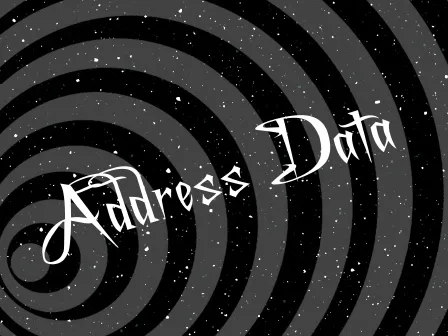
Picture this.
You're traveling through another dimension, a dimension not only of sight and sound but of mind. A journey into a wondrous land whose boundaries are that of imagination. That's the signpost up ahead - your next stop, the Twilight Zone!
Can you hear the 🎵 dee dee dee doo dee dee dee doo 🎵?

That is the familiar introduction to a show that would boggle our minds and twist reality as we know it. Today, apparently, is Twilight Zone Day. Celebrate how you will.
Another thing that boggles our minds and seems to twist reality as we know it is when addresses change or when they go by an alias, or when you ship something to someone's house at the exact address they told you, and it still gets returned for some reason.
All those who work with address data eventually become familiar with this Twilight Zone address experience. So the question is—like the question was in so many episodes of the show—how the heck do we get out of this?
Why Addresses Change
To escape the Twilight Zone address experience, you first need to understand why the addresses in your database are constantly changing. Street names, city name, and city boundaries change all the time, and ZIP Codes are constantly fluctuating too. Here are some common examples of addresses changing right under your nose.
Updating Street Names
A perfect example of a street change took place recently here in Provo, Utah. Near BYU a street was just changed from Bulldog Boulevard to Cougar Boulevard. This was in honor of BYU’s school mascot.
Changing City Names
City names change, and while not as often as street names, there are over 300 US cities that have had a former name. One notable city is Los Angeles which was previously named El Pueblo de Nuestra Señora la Reina de Los Ángeles de la Porciúncula.
ZIP Code Fluctuations
Zip Codes are constantly changing as cities, towns, populations, and states grow or change. In fact, 5% of ZIP+4 Codes change every month. With 193 million addresses in the US, that's over 9 million changes to ZIP+4 Codes every year.
To manage the changes, you have a choice to make; do you manually change every single one, double-checking every address, or do you ensure your address library uses helpful tools like Smarty’s address key.
Smarty’s address key, known as Smarty Key, mitigates the impact of these constantly changing addresses.
To put it as heavy-handedly as Rod Serling would have in one of his episodes, an address key is useful, nay, necessary, if you’re serious about a usable and trustworthy address database.

Another term you may use for address key is a persistent identifier. Your address keys must be persistent, meaning they will never change despite whatever happens to the address itself. This means that even if the masks of addresses get rezoned, changed to accommodate new standards, or whatever may cause the change, your database is still good.
So, if you're ready to escape the Twilight Zone of address data, consider implementing an address key in your database. It may just be the key to unlocking a more seamless and efficient workflow and a less confusing and frustrating experience for you and your team.
So as we add our messy homage to The Twilight Zone to the slew of others before us and give you suggestions on how to get out of your address data twilight zone, may we always remember the wise words of Rod Serling.
"A small footnote found in the court records of some parallel world. The name of Mitchell Chaplin, who served his sentence of invisibility and learned his lesson well. Too well. This time, however, he will wear his invisibility like a shield of glory. A shield forged in the very heart...of the Twilight Zone." ― Rod Serling
Just kidding, that one makes no sense in this context. How about this one:
"It may be said with a degree of assurance that not everything that meets the eye is as it appears." ― Rod Serling
That one works pretty well when talking about address aliases. But that’s no way to end a Twilight Zone blog; it doesn't leave you thinking, “Lands alive, what did I just read?”
How about this one?
"If in any quest for magic, in any search for sorcery, witchery, legerdemain, first check the human spirit." ― Rod Serling
Ok yeah. That'll do.

 Andrew Townsend
Andrew Townsend